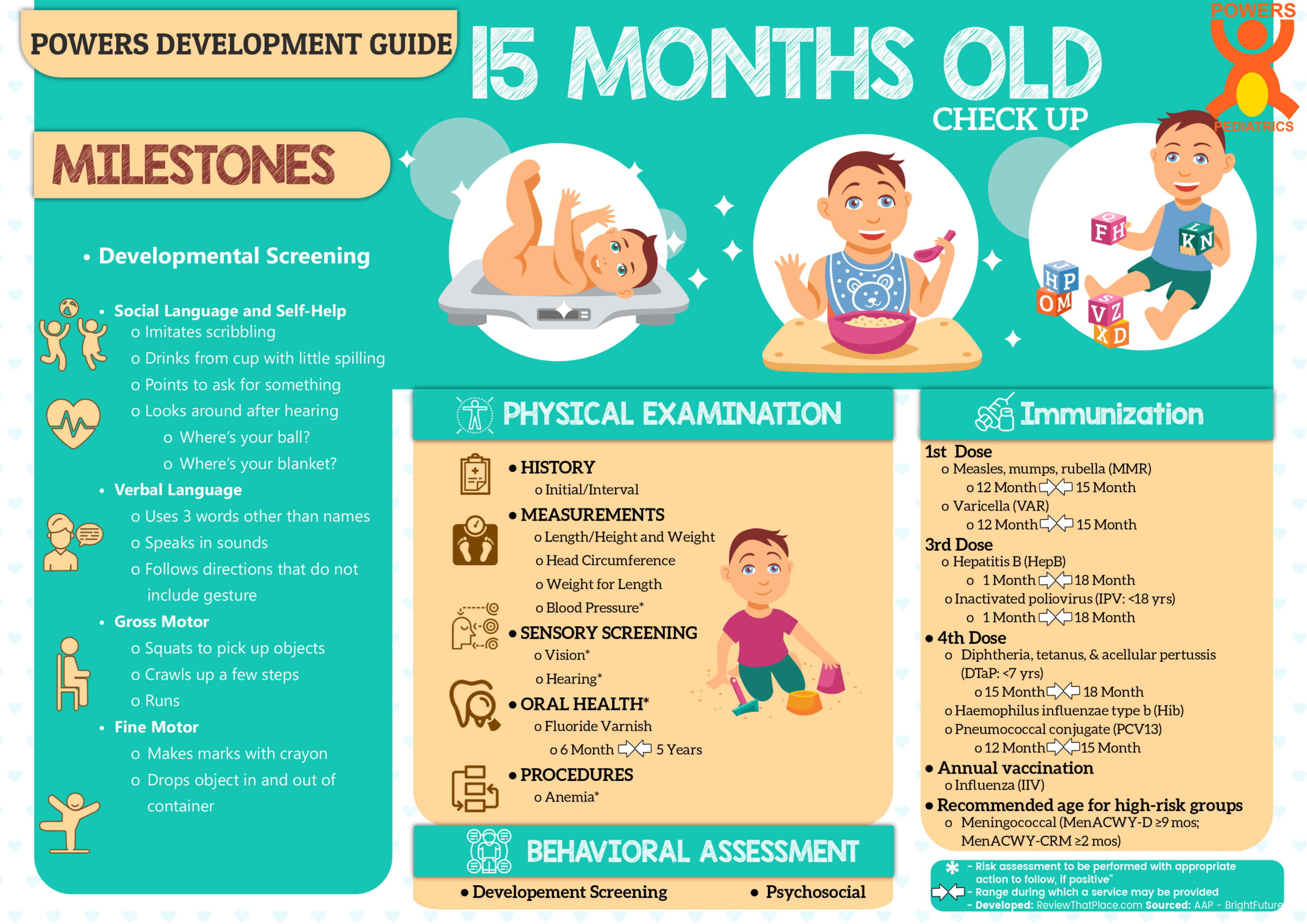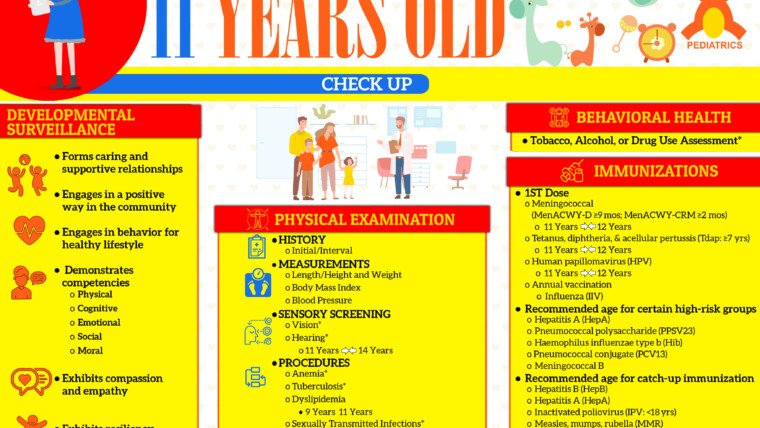What to except during a 15 Month Old Physical?
DEVELOPMENTAL SURVEILLANCE
- Social Language and Self-Help
- Imitates scribbling
- Drinks from cup with little spilling
- Points to ask for something
- Looks around after hearing
- Where’s your ball?
- Where’s your blanket?
- Verbal Language
- Uses 3 words other than names
- Speaks in sounds
- Follows directions that do not include gesture
- Gross Motor
- Squats to pick up objects
- Crawls up a few steps
- Runs
- Fine Motor
- Makes marks with crayon
- Drops object in and out of container
BEHAVIORAL HEALTH
3 PHYSICAL EXAMINATION
- History
- Initial/Interval
- Measurements
- Length/Height and Weight
- Head Circumference
- Weight for Length
- 4 Blood Pressure*
- Sensory Screening
- 5 Vision*
- Hearing*
- 6 Oral Health
- 7 Fluoride Varnish.
- 6 Month Thru 5 Years
- Procedures
- These may be modified, depending on entry point into schedule and individual need.
- 8 Anemia*
9 Immunization
- 1st Dose
- Measles, mumps, rubella (MMR)
- 12 Month 15 Month
- Varicella (VAR)
- 12 Month 15 Month
- 3rd Dose
- Hepatitis B (HepB)
- 1 Month 18 Month
- Inactivated poliovirus (IPV: <18 yrs)
- 1 Month 18 Month
- 4th Dose
- Diphtheria, tetanus, & acellular pertussis (DTaP: <7 yrs)
- 15 Month 18 Month
- Haemophilus influenzae type b (Hib)
- Pneumococcal conjugate (PCV13)
- 12 Month 15 Month
- Recommended age for certain high-risk groups
- Meningococcal (MenACWY-D ≥9 mos; MenACWY-CRM ≥2 mos)
- Annual vaccination
- Influenza (IIV)
15 Month Old Anticipatory Guidance
Communication and social development
◊ Individuation ◊ Separation ◊ Finding Support ◊ Attention to How Child Communicates Wants and Interests
- When possible, allow child to choose between 2 options acceptable to you.
- Stranger anxiety and separation anxiety reflect new cognitive gains; speak reassuringly.
- Take time for self, partner. Seek support from other parents.
- How does your child communicate what she wants? Does she point to something she wants and then watch to see if you see what she’s doing?
- Use simple, clear words and phrases to promote language development and improve communication.
Sleep routines and issues:
◊ Regular Bedtime Routine ◊ Night Waking ◊ No Bottle in Bed
- Maintain consistent bedtime and nighttime routine; tuck in when drowsy but still awake.
- If night waking occurs, reassure briefly; give stuffed animal or blanket for self-consolation.
- Don’t give bottle in bed. Don’t put TV/computer / digital device in child’s bedroom.
Temperament, development, behavior, and discipline
◊ Conflict Predictors and Distraction ◊ Discipline and Behavior Management
- What kinds of things do you find yourself saying no about?
- Modify child ‘s environment to avoid conflict / tantrums. Use distractions; accept messiness; allow child to choose (when appropriate).
- Praise good behavior and accomplishments.
- How are you and your partner managing your child’s behavior? What do you do when you disagree?
- Use discipline for teaching /protecting, not punishing. Use time-outs to avoid negative attention.
- Teach child not to hit, bite, use aggressive behavior. Model this yourself.
Healthy teeth
◊ Brushing Teeth ◊ Reducing Caries
- Schedule first dental visit if child hasn’t seen dentist yet.
- Brush teeth twice a day with small smear of fluoridated toothpaste, soft toothbrush.
- Prevent tooth decay by good family oral health habits (brushing, flossing), not sharing utensils or cup.
- If child uses nighttime bottle, use water only.
Safety
◊ Car Safety Seats ◊ Parental Use of Seat Belts ◊ Safe Home Environment: Poisoning ◊ Falls ◊ Fire Safety
- Car Seats
- Use rear-facing car safety seat until child is highest weight or height allowed by manufacturer
- Make necessary changes when switching seat to forward facing
- Never place vehicle safety seat in front seat of car with passenger air bag; backseat safest
- Make sure everyone uses a seat belt.
- When did you last examine your home to make sure it is safe? What emergency numbers do you have posted near your phones?
- Remove poisons/toxic household products; keep Poison Help number (800-222-1222) at every phone, including cell; use stair gates; keep furniture away from windows; install window guards.
- Install smoke detector on every level; test monthly/change batteries annually; make fire escape plan; set home hot water less than 120°F.
Goals For 15 Month Check up:
- Be gentle and patient
- Get more sleep
- Make a budget
- Leave your work at the office
- Focus on self-care
- Meditate as a family
- Find an outlet
- “cell-free” zone
- Spend more time with your partner
- Take more baths
- Have a girls’/boys’ night
- Be more flexible
- See your child for who they are
- Teach your child to speak up
- Help those less fortunate
- Drink more water
- Find 30 minutes a day of “me” time
- Challenge yourself
- Focus on experiences, not things
- Make health a priority
- Start—or finish—a degree
- Inform yourself
- Maintain balance
- Laugh often
- Cook dinner more frequently
- Ask for help
- Have designated “cheat” days
- Stop having FOMO
- Say “I love you” more often
- See for reference ↩︎
- This assessment should be family centered and may include an assessment of child social-emotional health, caregiver depression, and social determinants of health. (Reference) ↩︎
- At each visit, age-appropriate physical examination is essential, with infant totally unclothed and older children undressed and suitably draped. The extent of the physical examination is determined by both the reason for the visit and diagnostic considerations raised during the taking of the history. (Reference) ↩︎
- Blood pressure measurement in infants and children with specific risk conditions should be performed at visits before age 3 years. (Reference) ↩︎
- Instrument-based screening may be used to assess risk at ages 12 and 24 months.(Reference) ↩︎
- Recommend brushing with fluoride toothpaste in the proper dosage for age. (Reference) ↩︎
- Once teeth are present, fluoride varnish may be applied to all children every 3–6 months in the primary care or dental office. (Reference) ↩︎
- Perform risk assessment or screening, as appropriate, per recommendations in the current edition of the AAP Pediatric Nutrition. ↩︎
- Every visit should be an opportunity to update and complete a child’s immunizations. (Reference) ↩︎



